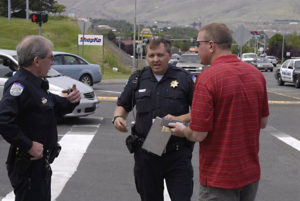Following grand jury decisions not to indict police officers involved in the deaths of Michael Brown and Eric Garner, many California citizens have taken the streets to express their disapproval and frustration. In some cases, police have reacted to these demonstrations by issuing arrests. By doing so, police may be violating your Constitutional rights. Knowing your legal rights may help you avoid an arrest or conviction.
The U.S. and California Constitutions protect your right to free speech and peaceful assembly to protest. However, if you are not a U.S. citizen, take caution that any arrest could result in deportation.
First Amendment: Conduct Over Content
 What you can or cannot say. The government generally cannot regulate the content of what is said, whether one criticizes alleged police corruption, an imperfect justice system, or even the president. However, free speech rights do not extend to defamatory statements, true threats, or a call to action that is likely to incite a riot, imminent unlawful behavior, or a threat to public safety. Moreover, the police can regulate your conduct while protesting that could amount to a violation of the law.
What you can or cannot say. The government generally cannot regulate the content of what is said, whether one criticizes alleged police corruption, an imperfect justice system, or even the president. However, free speech rights do not extend to defamatory statements, true threats, or a call to action that is likely to incite a riot, imminent unlawful behavior, or a threat to public safety. Moreover, the police can regulate your conduct while protesting that could amount to a violation of the law.
When, where, and how can one protest? Your First Amendment right may depend on the location you choose to exercise that right. State and local governments may require a permit or place reasonable restrictions on when and how one can protest, so as not to infringe on other conflicting rights. Similarly, the police have a responsibility to maintain peace and order. As long as you don’t “realistically present serious traffic, safety, and competing-use concerns beyond those presented on a daily basis by ordinary use of the streets and sidewalks,” you shouldn’t need a permit.1 You generally will not need a permit to hold a rally in a public park or to march on the sidewalk while obeying traffic laws.2
Taking It to the Streets
The best places to protest are parks, sidewalks or public streets, all of which are protected legal venues. Other locations that the government has held out for speech related activity include public auditoriums, the steps of your city hall or plaza, as well as in front of government buildings such as a police station.
Police cannot arrest or use force to prevent you from exercising your 1st Amendment rights when local time, place, and manner restrictions are observed. They may however use reasonable force when you are breaking the law. There is sometimes a fine line between responsible protesting and committing an arrestable offense. Unless there is a “clear and present danger of riot, disorder, interference with traffic upon the public streets, or other immediate threat to public safety” you have the right to protest in a public place.3
What about private property? Generally the First Amendment does not offer protection when protesting on private property without the owner’s permission. However, special rules may apply for specific locations such as shopping malls, schools, hospitals, or even places of worship. Be sure to consult with a legal advisor before protesting at one of these places.
Are there any state law distinctions in California? In addition to the above federal guidelines, California sometimes applies the “basic incompatibility” test. This test prohibits expressive activity on government property only when the speech is incompatible with the normal activity of the venue. Protesters have recently been arrested for blocking major highway interstates in California. Highways have never been considered a traditional venue for such activity. Highway obstruction is not only dangerous, but were it to interfere with government function, access to hospitals, or threaten public safety, it could be deemed unlawful.
Obstructing Justice, Resisting Arrest, or Delaying an Officer (PC 148)
 A conviction for violating PC 148 could mean a $1,000 and up to a year in jail. In order to be convicted, the prosecution must prove that:
A conviction for violating PC 148 could mean a $1,000 and up to a year in jail. In order to be convicted, the prosecution must prove that:
- The defendant willfully resisted, delayed, or obstructed an officer
- While the officer was engaged in the performance of his or her duties, and that
- You knew or reasonably should have known that the other person was an officer engaged in the performance of his or her duties.4
Our skilled criminal defense attorneys at Wallin & Klarich know the legal defenses to this crime. Some defenses might include:
- You committed no willful act to delay, resist, or obstruct an officer’s duties.
- You were not put on reasonable notice that the officer was in fact an on duty police officer.
Disorderly Conduct, Fighting Words, or Disturbing the Peace (PC 415)
A conviction for violating PC 415 could mean a $400 and up to a 90 days in jail. In order to be convicted, the prosecution must prove that:
- You unlawfully fought in a public place or challenged another person in a public place to fight,
- You maliciously and willfully disturbed another person by loud and unreasonable noise, or
- You used offensive words in a public place, which are inherently likely to provoke an immediate violent reaction.5
Other Potential Charges:
- Disrupting a public meeting (PC 403)
- Riot and unlawful assembly (PCs 404-408)
- Failure to disperse (PC 409)
- Trespassing on private property (PC 602)
- Willfully failing or refusing to comply with a lawful order, signal, or direction of an officer enforcing traffic under Vehicle Code Section 2800(a)
Defenses to Protest-Related Charges
- Your First Amendment right was violated because you properly exercised your rights and observed all state law, local ordinances, and permit requirements.
- Challenge the local ordinance as being unconstitutionally vague or overbroad as written.
- You lacked the requisite intent or mental state necessary to amount to a crime as charged.
Tips for Protesting Lawfully
 Carry identification on you when planning a protest. Failure to carry identification may cause you to be jailed rather than be issued a ticket.
Carry identification on you when planning a protest. Failure to carry identification may cause you to be jailed rather than be issued a ticket.- Avoid advocating for violence or imminent unlawful activity. The moment you do, you are no longer protected by the First Amendment.
- Plan ahead. Check you local ordinances and obtain a permit ahead of time when necessary. However, accommodations should be made for spontaneous protest following breaking news.6
Call the Attorneys at Wallin & Klarich Today
If you or a loved one has been charged with a crime, you need to contact an experienced Wallin & Klarich criminal defense attorney immediately. At Wallin & Klarich, our skilled attorneys have been successfully defending clients facing criminal charges for over 30 years.
We all have a right to voice our opinions freely in a responsible manner without police intervention and we want to help you protect that right. We will meet with you immediately to review the facts of your case, and plan a defense strategy that will help you get the very best outcome possible.
With offices located in Los Angeles, Sherman Oaks, Torrance, Orange County, San Diego, Riverside, San Bernardino, Ventura, West Covina and Victorville, there is an experienced Wallin & Klarich criminal defense attorney available to help you no matter where you work or live.
Call us today at (888) 280-6839 for a free phone consultation. We will be there when you call.
1. [Santa Monica Food Not Bombs v. City of Santa Monica, 450 F.3d 1022, 1039, 1040-43 (9th Cir. 2006) (“SMFNB”) ]↩
2. [See SMFNB, 450 F.3d at 1039, 1040-43; American-Arab Anti-Discrimination Committee v. City of Dearborn, 418 F.3d 600, 608 (6th Cir. 2005). ]↩
3. [Papineau v. Parmley, 465 F.3d 46, 56-57 (2d Cir. 2006) (internal quotations omitted). ]↩
4. [Pen. Code § 148]↩
5. [Pen. Code § 415]↩
6. [Long Beach Area Peace Network, 2009 WL 2195354, at *22-*24; NAACP. v. City of Richmond, 743 F.2d 1346, 1356-57 (9th Cir. 1984). ]↩


